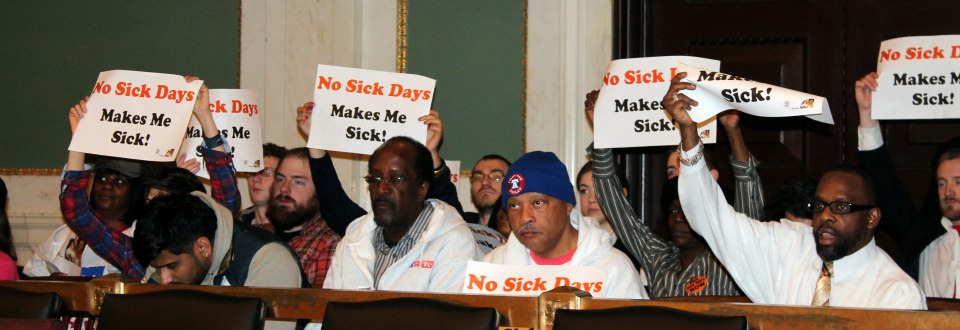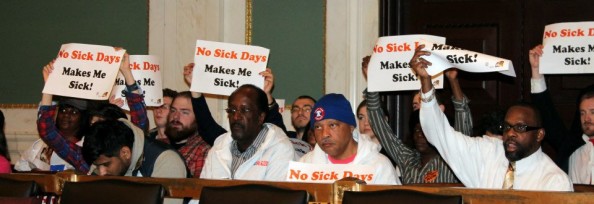Preserving Democracy in Pennsylvania

By Ellen Bravo
It had all the trappings of an ALEC-backed attack on democracy: Push out a bill prohibiting local governments from passing workplace protections in their own communities. If all else failed, tack the measure onto some popular bill as an amendment and hope the supporters of that bill would want it badly enough to allow the hostile amendment to stand.
Only this time the strategy didn’t work, thanks to the strong stand of progressive legislators and the smart organizing of a broad coalition – particularly the leadership of anti-violence advocates.
In this case, the state was Pennsylvania. The preemption attempt was aimed at stopping future passage of a municipal paid sick days ordinance. And the popular bill held hostage was one to aid those who experience domestic violence.
First Rep. Seth Grove, a member of the American Legislative Exchange Council or “ALEC,” tried to pass a stand-alone bill that would take away the right of local units of government to pass laws ensuring workers could earn paid sick days – or even unpaid leave. Other legislators added multiple amendments to the bill that would have required every elected official to take votes that might have been unpopular with their constituents. The measure didn’t move.
So another ALEC member, John Eichelberger, decided to try a different tack: stick the preemption provision as an amendment onto a bipartisan bill to help those experiencing domestic violence. HB 1796 was written to exempt victims of domestic violence from “nuisance ordinances” that allow landlords to evict those who call 911 more than a certain number of times within a given period. The bill had passed the House with broad bipartisan support.
The preemption seekers assumed advocates in the area of domestic violence would not let anything stand in the way of passage of their bill. They assumed wrong. Instead, the Pennsylvania Coalition Against Domestic Violence and other organizations let it be known they would not support their own bill if the amendment were included.
After calls and emails and lots of social media, a number of legislators on both sides of the aisle decided they had to return the domestic violence bill to its original, unamended version. That bill then passed unanimously.
“We’re delighted to see that our Senators prevailed over the tactics of corporate lobbyists and donors who tried to hijack a non-controversial bill protecting domestic violence victims,” said Marianne Bellesorte of PathWays PA, chair of the PA Coalition for Healthy Families and Workplaces. “We applaud the leadership of the domestic violence groups and other advocates for ensuring these corporate lobbyists didn’t get away with sneaking a controversial preemption bill through the legislature by hitching it to a good bill to protect those who experience domestic violence.
“We ask that legislators put their energy behind passing – not preventing – earned sick days legislation statewide,” said Bellesorte. “Earned sick days help strengthen families and the economy. The policy keeps working Pennsylvanians from having to choose between going to work sick or losing a day’s wages – or worse, a job. Instead of undermining democracy and local control, we need to work toward solutions that help – not hurt – our state’s working families.”
The Pennsylvania attempt is the most recent of a string of efforts backed by the ALEC, the National Restaurant Association and other special interests to limit not just who can vote, but what they can vote for.
In August 2011, members of ALEC shared a paid sick days preemption bill signed into law by Wisconsin Governor Scott Walker at the group’s meeting New Orleans with its Labor and Business Regulation Subcommittee. Participants received a target list and map of state and local paid sick days policies prepared by the National Restaurant Association.
So far 11 states have passed laws prohibiting voters or legislators in local communities from passing paid sick days – and in some cases other workplace protections. Two of those, Oklahoma and Alabama, passed in 2014. But similar efforts this year failed in Washington, South Carolina and now Pennsylvania – a place that had been declared a priority by the PA Restaurant Association.
As activists around the country celebrate a growing string of wins on paid sick days, special interests who are finding it harder to squash them.
